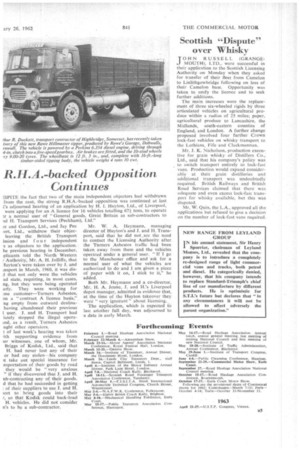Scottish "Dispute ', over Whisky
Page 37

If you've noticed an error in this article please click here to report it so we can fix it.
TOHN RUSSELL (GRANGE.) MOUTH), LTD„ were successful in their application to the Scottish Licensing Authority on Monday when they asked for transfer of their fleet from Camelon to Linlithgowbridge following on loss of their Camelon base, Opportunity was taken to unify the licence and to seek further additions.
The main increases were the replacement of three six-wheeled rigids by three articulated vehicles on agricultural produce within a radius of 25 miles; paper, agricultural produce to Lancashire, the Midlands, south-eastern counties of England, and London. A further change proposed involved four further Crown lock-fast vehicles on whisky transport to the Lothians, Fife and Clackmannan.
Mr. J. K. Nicholson, production executive for grain whisky of Distillers Co., Ltd., said that his company's policy was to switch transport entirely to lock-fast vans. Production would expand considerably at their grain distilleries and additional transport was undoubtedly required. British Railways and British Road Services claimed that there was adequate and even excess lock-fast transport for whisky available, but this was disputed, Mr. W. Quin, the L.A., approved all the applications but refused to give a decision on the number of lock-fast vans required.




















































































































